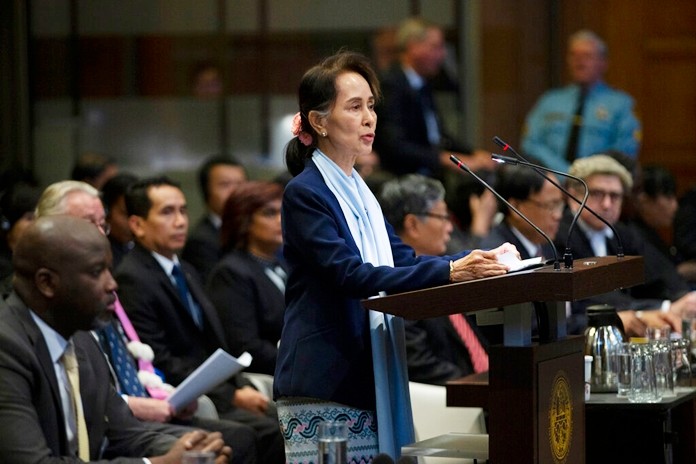
THE HAGUE, Netherlands (AP) — Myanmar’s former pro-democracy icon Aung San Suu Kyi on Wednesday denied that her country’s armed forces committed genocide against the Rohingya minority, telling the U.N.’s top court that the exodus of hundreds of thousands of Muslims was the unfortunate result of a battle with insurgents.
In a measured tone, Suu Kyi calmly refuted allegations that the army had killed civilians, raped women and torched houses in 2017 in what Myanmar’s accusers describe as a deliberate campaign of ethnic cleansing and genocide that saw more than 700,00 Rohingya flee to neighboring Bangladesh.
She said the allegations stem from “an internal armed conflict started by coordinated and comprehensive armed attacks … to which Myanmar’s defense services responded. Tragically, this armed conflict led to the exodus of several hundred thousand Muslims.”
Her appearance at the International Court of Justice was striking in that Suu Kyi was defending the very armed forces that had kept her under house arrest for about 15 years. She was awarded the 1991 Nobel Peace Prize in absentia for championing democracy and rights under Myanmar’s then-ruling junta. A small group of her supporters gathered Wednesday outside The Hague-based court.
Suu Kyi told the court that the African nation of Gambia, which brought the legal action against Myanmar on behalf of the 57-country Organization of Islamic Cooperation, had provided “an incomplete and misleading factual picture” of what happened in Myanmar’s northern Rakhine state in August 2017.
Gambia alleges that genocide was committed and is still ongoing. It has asked the world court to take action to stop the violence, including “all measures within its power to prevent all acts that amount to or contribute to the crime of genocide” in Myanmar.
But Suu Kyi said developments in one of Myanmar’s poorest regions are “complex and not easy to fathom.” She detailed how the army responded on Aug. 25, 2017, to attacks by insurgents trained by Afghan and Pakistan extremists.
Addressing the court in her capacity as Myanmar’s foreign minister, Suu Kyi insisted that the country’s armed forces had tried “to reduce collateral damage” during fighting in 12 locations. While conceding that excessive force might have been used and that one helicopter may have killed “non-combatants,” Suu Kyi said a Myanmar investigation is looking into what happened and should be allowed to finish its work.
“Can there be genocidal intent on the part of a state that actively investigates, prosecutes and punishes soldiers and officers who are accused of wrongdoing?” she asked the court.
Suu Kyi and Myanmar’s legal team argued that the genocide convention does not apply to Myanmar. They invoked Croatia during the Balkans wars in the 1990s, saying that no genocide was deemed there when thousands of people were forced from their homes by fighting.
On Tuesday, Justice Minister Aboubacarr Tambadou urged the International Court of Justice to “tell Myanmar to stop these senseless killings, to stop these acts of barbarity that continue to shock our collective conscience, to stop this genocide of its own people.”
Also Tuesday, the U.S. slapped economic sanctions on four Myanmar military officers suspected of human rights violations. It sanctioned Min Aung Hlaing, commander of Myanmar’s armed forces, over allegations of serious rights abuses. Deputy commander Soe Win and two other military leaders, Than Oo and Aung Aung, were also targeted.
“There are credible claims of mass-scale rape and other forms of sexual violence committed by soldiers under Min Aung Hlaing’s command,” a U.S. statement said.
The court’s hearings on Myanmar are scheduled to end Thursday.
 |
 |
 |





